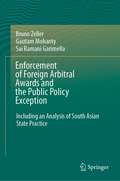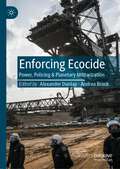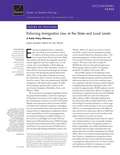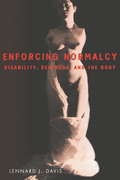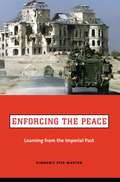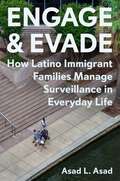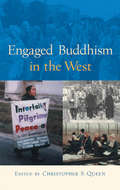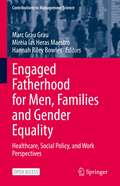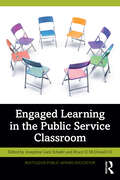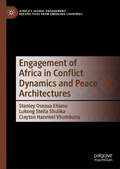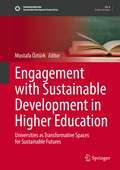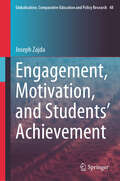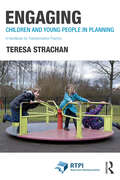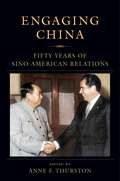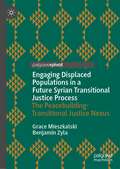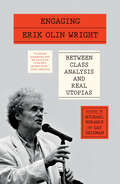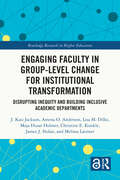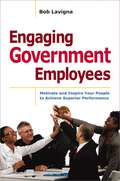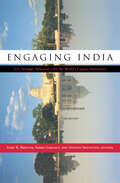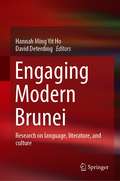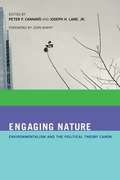- Table View
- List View
Enforcement of Foreign Arbitral Awards and the Public Policy Exception: Including an Analysis of South Asian State Practice
by Sai Ramani Garimella Bruno Zeller Gautam MohantyThe book presents arguments derived from primary sources related to international arbitration in South Asian jurisdictions, a list of the same is made available therein. The book is a research statement on the contemporary concerns within international commercial arbitration, especially related to enforcement of foreign arbitral awards. Importantly, the book through a unique methodology of interface, presents the gratuitous nature of Article 34 of the UNCITRAL Model Law when read with Article V of the New York Convention, especially the plea to the States within Article VII of the same Convention to ease the restrictions and the process of enforceability of foreign arbitral awards. The book also articulates another important and immediate need with regard to international arbitration – the delimitation of public policy exception to recognition and enforcement of foreign arbitral awards. It critiques the jurisprudence related to arbitration in jurisdictions spread across different geographic regions, thereby enabling the reader to gain an insight into their practices, apart from ensuring a comparative perspective. The book addresses the primary concern related to international arbitration – enforcement of foreign arbitral awards and the grounds for challenges articulated within the New York Convention and the UNCITRAL Model Law. It addresses these grounds, and articulates the necessity for carving the criteria for the application of public policy exception. The book will not only be a useful resource for policy makers, students and researchers interested in international commercial arbitration, and private international law, but also for practitioners working on dispute resolution in trans-jurisdictional disputes in South Asia and beyond.“…The present book is not just another book contributing to the endless list of literature already widely used in International Commercial Arbitration on public policy but, in my opinion, is unique in many respects. The distinguishing factor of this book is its regional perspective…" - Justice Deepak Verma, Former Judge of Supreme Court of India and Arbitrator“…This book addresses this core element of the success story of arbitration: enforcement and refusal to enforce and, hence, its relevance cannot be overstated…” - Csongor István Nagy, Professor of Law and Head, Department of Private International Law, University of Szeged, Hungary Detailed Forewords are available in the book and can be freely downloaded from https://link.springer.com/book/10.1007/978-981-16-2634-0
Enforcing Ecocide: Power, Policing & Planetary Militarization
by Alexander Dunlap Andrea BrockPolicing and ecological crises – and all the inequalities, discrimination, and violence they entail – are pressing contemporary problems. Ecological degradation, biodiversity loss, and climate change threaten local communities and ecosystems, and, cumulatively, the planet as a whole. Police brutality, wars, paramilitarism, private security operations, and securitization more widely impact people – especially people of colour – and habitats. This edited collection explores their relationship, and investigates the numerous ways in which police, security, and military forces intersect with, reinforce, and facilitate ecological and climate catastrophe. Employing a case study-based approach, the book examines the relationships and entanglements between policing and ecosystems, revealing the intimate connection between political violence and ecological degradation.
Enforcing Immigration Law at the State and Local Levels
by Don Prosnitz Jessica Saunders Nelson LimAlmost 12 million out-of-status aliens currently reside in the United States. The federal government does not require state and local agencies to carry out specific immigration enforcement actions; however, comprehensive immigration reform may do so in the near future. This paper describes variations in enforcement approaches and making their pros and cons more explicit.
Enforcing Normalcy
by Lennard J. DavisIn this highly original study of the cultural assumptions governing our conception of people with disabilities, Lennard J. Davis argues forcefully against "ableist" discourse and for a complete recasting of the category of disability itself.Enforcing Normalcy surveys the emergence of a cluster of concepts around the term "normal" as these matured in western Europe and the United States over the past 250 years. Linking such notions to the concurrent emergence of discourses about the nation, Davis shows how the modern nation-state constructed its identity on the backs not only of colonized subjects, but of its physically disabled minority. In a fascinating chapter on contemporary cultural theory, Davis explores the pitfalls of privileging the figure of sight in conceptualizing the nature of textuality. And in a treatment of nudes and fragmented bodies in Western art, he shows how the ideal of physical wholeness is both demanded and denied in the classical aesthetics of representation.Enforcing Normalcy redraws the boundaries of political and cultural discourse. By insisting that disability be added to the familiar triad of race, class and gender, the book challenges progressives to expand the limits of their thinking about human oppression.From the Trade Paperback edition.
Enforcing the Law: Case of the Clean Water Acts (Bureaucracies, Public Administration, And Public Policy Ser.)
by Susan Hunter Richard W. WatermanThis text provides an analysis of the EPA enforcement of the Clean Water Act and its amendments. The book uses extensive EPA data, including a survey of the EPA and state level environmental officials, to examine enforcement from the perspective of the enforcement personnel.
Enforcing the Peace: Learning from the Imperial Past
by Marten Kimberly ZiskFocusing on operations in Haiti, Bosnia, Kosovo, and East Timor in the mid- to late 1990s, while touching on both postwar Afghanistan and the occupation of Iraq, Enforcing the Peace compares these cases to the colonial activities of Great Britain, France, and the United States at the turn of the twentieth century. As an alternative to trying to control political developments abroad, Marten shows how serious foreign intervention can restore basic security to unstable regions. She argues that the colonial experience demonstrates that military organizations police effectively if political leaders prioritize the task. The time has come to raise the importance of armed peacekeeping on the international agenda.
Enforcing the Peace: Learning from the Imperial Past
by Kimberly Zisk MartenAnarchy makes it easy for terrorists to set up shop. Yet the international community has been reluctant to commit the necessary resources to peacekeeping—with devastating results locally and around the globe. This daring new work argues that modern peacekeeping operations and military occupations bear a surprising resemblance to the imperialism practiced by liberal states a century ago. Motivated by a similar combination of self-interested and humanitarian goals, liberal democracies in both eras have wanted to maintain a presence on foreign territory in order to make themselves more secure, while sharing the benefits of their own cultures and societies. Yet both forms of intervention have inevitably been undercut by weak political will, inconsistent policy choices, and their status as a low priority on the agenda of military organizations. In more recent times, these problems are compounded by the need for multilateral cooperation—something even NATO finds difficult to achieve but is now necessary for legitimacy. Drawing lessons from this provocative comparison, Kimberly Zisk Marten argues that the West's attempts to remake foreign societies in their own image—even with the best of intentions—invariably fail. Focusing on operations in Haiti, Bosnia, Kosovo, and East Timor in the mid- to late 1990s, while touching on both post-war Afghanistan and the occupation of Iraq, Enforcing the Peace compares these cases to the colonial activities of Great Britain, France, and the United States at the turn of the twentieth century. The book weaves together examples from these cases, using interviews Marten conducted with military officers and other peacekeeping officials at the UN, NATO, and elsewhere. Rather than trying to control political developments abroad, Marten proposes, a more sensible goal of foreign intervention is to restore basic security to unstable regions threatened by anarchy. The colonial experience shows that military organizations police effectively if political leaders prioritize the task, and the time has come to raise the importance of peacekeeping on the international agenda.
Engage and Evade: How Latino Immigrant Families Manage Surveillance in Everyday Life
by Asad L. AsadHow everyday forms of surveillance threaten undocumented immigrants—but also offer them hope for societal inclusionSome eleven million undocumented immigrants reside in the United States, carving out lives amid a growing web of surveillance that threatens their and their families&’ societal presence. Engage and Evade examines how undocumented immigrants navigate complex dynamics of surveillance and punishment, providing an extraordinary portrait of fear and hope on the margins.Asad L. Asad brings together a wealth of research, from intimate interviews and detailed surveys with Latino immigrants and their families to up-close observations of immigration officials, to offer a rare perspective on the surveillance that undocumented immigrants encounter daily. He describes how and why these immigrants engage with various institutions—for example, by registering with the IRS or enrolling their kids in public health insurance programs—that the government can use to monitor them. This institutional surveillance feels both necessary and coercive, with undocumented immigrants worrying that evasion will give the government cause to deport them. Even so, they hope their record of engagement will one day help them prove to immigration officials that they deserve societal membership. Asad uncovers how these efforts do not always meet immigration officials&’ high expectations, and how surveillance is as much about the threat of exclusion as the promise of inclusion.Calling attention to the fraught lives of undocumented immigrants and their families, this superbly written and compassionately argued book proposes wide-ranging, actionable reforms to achieve societal inclusion for all.
Engaged Buddhism in the West
by Christopher S. QueenEngaged Buddhism is founded on the belief that genuine spiritual practice requires an active involvement in society. Engaged Buddhism in the West illuminates the evolution of this new chapter in the Buddhist tradition - including its history, leadership, and teachings - and addresses issues such as violence and peace, race and gender, homelessness, prisons, and the environment. Eighteen new studies explore the activism of renowned leaders and organizations, such as Thich Nhat Hanh, Bernard Glassman, Joanna Macy, the Buddhist Peace Fellowship, and the Free Tibet Movement, and the emergence of a new Buddhism in North America, Europe, South Africa, and Australia.
Engaged Fatherhood for Men, Families and Gender Equality: Healthcare, Social Policy, and Work Perspectives (Contributions to Management Science)
by Hannah Riley Bowles Mireia las Heras Maestro Marc Grau GrauThis aim of this open access book is to launch an international, cross-disciplinary conversation on fatherhood engagement. By integrating perspective from three sectors—Health, Social Policy, and Work in Organizations—the book offers a novel perspective on the benefits of engaged fatherhood for men, for families, and for gender equality. The chapters are crafted to engaged broad audiences, including policy makers and organizational leaders, healthcare practitioners and fellow scholars, as well as families and their loved ones.
Engaged Learning in the Public Service Classroom (Routledge Public Affairs Education)
by Bruce D. McDonald Josephine Gatti SchaferMany that pursue a career in public service do so because they have a passion for their communities and want to pursue solutions to vexing challenges in society. As a result, instructors teaching public service, administration, and policy courses are challenged to incorporate a range of community engagement practices into their classes to allow students to explore their passion in greater depth, while also developing skills to operate in a dynamic governance environment. This pedagogical text explores the variety of ways in which students can become more engaged throughout the public service curriculum.Engaged Learning in the Public Service Classroom introduces a wide range of activities, practices, and behaviors involving students in learning by exploring real-world contexts and issues. Utilizing the tools and concrete examples in the book, students are encouraged to actively explore, experiment, evaluate, and reflect on practical challenges, helping to foster their critical thinking and motivating them to learn. Considering the numerous methods of engaged learning, the editors offer a framework for understanding and implementing different types of engaged learning practices, including Field of Practice, Community as Laboratory, and Service Learning, exploring the benefits and practical considerations of each. To maximize the book’s utility and to provide faculty with the best opportunity for successful implementation, the final section of the book focuses on anticipating and overcoming possible challenges when implementing engaged learning.This innovative new book is designed specifically to help support current and future instructors and faculty in the disciplines of public affairs, public administration, and public policy, including graduate students.
Engagement of Africa in Conflict Dynamics and Peace Architectures (Africa's Global Engagement: Perspectives from Emerging Countries)
by Stanley Osezua Ehiane Lukong Stella Shulika Clayton Hazvinei VhumbunuThis book examines the nature of conflict in Africa vis-à-vis the African Union (AU) peace and security architecture in Africa. It focuses on the intense campaign ‘Silencing the Guns by 2020’ since 2013, one of the flagship projects of Agenda 2063 to achieve a conflict-free continent by AU. It analyses various causes of conflict in Africa using case studies to pursue the causality and dynamics of these conflicts, which often point to the intersectionality of historical legacies of colonialism and neo-colonialism. It further examines the interplay of factors such as resource curse, resource exploitation, election-induced violence, political violence, incessant and interminable challenges of social justice, oppression, contemporary governance, and leadership dynamics. It also focuses on the application and integration of conflict and gender for analytical reflection. In the quest for a “Peaceful and secure Africa”, this book examines the different mechanisms to prevent, manage, and resolve conflicts on the continent, and the challenges thereof. It probes and investigates by asking critical questions about continental conflict dynamics and peace architectures which warrants in-depth inquiry and interrogation.
Engagement with Sustainable Development in Higher Education: Universities as Transformative Spaces for Sustainable Futures (Sustainable Development Goals Series)
by Mustafa ÖztürkThis edited volume analyzes cases of higher education programs engaging with sustainable development. Offering cases from across the globe that focus on the role of universities in promoting societal transformations and building sustainable futures, the volume specifically discusses how higher education institutions can educate for the Sustainable Development Goals (SDGs). As critical spaces for research, development, and innovation, higher education institutions are fundamental change agents for societal transformations. Their role in disseminating sustainability through different paths is undeniable, and it is worth discussing the dimensions that surround the concept of sustainability within universities. Considering the role of policy, curriculum, practice, teaching, research, and development paths in universities, this book looks at the contributions of higher education sector to our vision of sustainable development. This publication offers readers a chance to look at different higher education institutions’ engagement with sustainable development through political, managerial, curricular and practical steps.
Engagement, Motivation, and Students’ Achievement (Globalisation, Comparative Education and Policy Research #48)
by Joseph ZajdaThis book analyses discourses of the use of engagement and motivation in schools globally. It focuses on the overall impact of engagement on teachers, students’ motivation, students’ well-being, and standards. It examines the role of engagement and motivation impacting teachers and students in the classroom, and the overall impact of inclusive classroom models to improve their performance in the classroom. The book analyses topics such as cultural identities and engagement, students’ personalities and their impact on learning, the role of intelligence in learning, social learning, engagement in collaborative groups, and teachers’ role in promoting engagement in the classroom. The book contributes in a very scholarly way, to a more holistic understanding of the nexus between globalisation, dominant models of motivation, and students’ engaging learning environments, and their academic achievement.
Engaging Children and Young People in Planning: A Handbook for Transformative Practice (ISSN)
by Teresa StrachanEngaging Children and Young People in Planning places planners’ skills for engagement with children and young people centre stage by discussing several projects delivered or supported by planning students to young people in the Northeast of England. Urban or town and country planning is a largely unfamiliar concept to children and young people. Moreover, in England, the environment in which young people live, play and go to school is shaped by a local planning process which lacks their input. This book explores the nature of the gap between that planning process and the voice of the younger members of the community, as well as the barriers that impede this engagement. It highlights why an engagement process is beneficial for those young people, for the wider community and for the planning process itself. At a time when our relationship with and impact on, the environment is being re-examined, this book challenges the planning professional to identify, develop and reflect upon the engagement skills that will help to transform planning into a more inclusive practice. It will be of use to scholars and practitioners in urban planning, community planning, engagement and children’s rights, whilst supporting their academic and professional development pathways.
Engaging China
by Paul EvansFor more than four decades, engagement has been the bedrock of Canada's policy toward China, as Ottawa has attempted to assist China's entry into the international system and advance a commercial agenda. More than just high policy, engagement has also been a recurrent narrative that sees changing China as a moral enterprise as important as trade and diplomacy. As global China's economic and diplomatic reach has expanded, policy makers in Ottawa have not fashioned an effective response. They are failing to produce a compelling strategy that addresses the power shift underway and growing public anxiety about China at home.Engaging China is a concise account of the evolution and state of the Canadian approach to China, its achievements, disappointments, and current dilemmas. Written by Paul Evans, professor at the Institute of Asian Research at the University of British Columbia and former head of the Asia Pacific Foundation of Canada, the volume inaugurates the UTP Insights series - books that take on the issues crucial to understanding our world and Canada's place within it.Evans's assessment of the evolution of Canada's China policy speaks to the intellectual history of the idea of "engagement," and assesses its internal contradictions and possibilities. He provides the elements of a comprehensive and strategic approach to China's central role in the most important power shift in the global order since World War II.
Engaging China: Fifty Years of Sino-American Relations (A Nancy Bernkopf Tucker and Warren I. Cohen Book on American–East Asian Relations)
by Anne ThurstonThe importance of the relationship between the United States and the People’s Republic of China has only grown since Richard Nixon’s epochal visit in 1972. By the early twenty-first century, when the rise of China had become an inescapable fact, most American policy makers and experts saw bilateral ties with China as the most consequential foreign-relations priority for the United States.In recent years, even before the coronavirus pandemic, the U.S.–China relationship has rapidly deteriorated—and the whole world has felt the consequences. This book brings together leading China specialists to offer a retrospective on relations between the United States and China over the last half-century and consider what might be next. The contributors—including academics, leaders of China-related nongovernmental organizations, and former diplomats and government officials—analyze the relationship from a range of perspectives: political, diplomatic, economic, social, cultural, commercial, educational, medical, and military. They reassess American engagement with China from the late Mao years onward, covering leaders from Deng Xiaoping through Xi Jinping. The contributors highlight not only the accomplishments and hard-won successes of engagement but also the mistakes and misunderstandings, acknowledging the well-earned distrust and genuine frictions that plague the relationship today.Multidisciplinary and comprehensive, Engaging China is a vital reconsideration for a time when the stakes of U.S. policy toward China have never been higher.
Engaging Displaced Populations in a Future Syrian Transitional Justice Process: The Peacebuilding-Transitional Justice Nexus (Memory Politics and Transitional Justice)
by Benjamin Zyla Grace MieszkalskiThis book offers an analysis of a prospective transitional justice process in Syria. As the Syrian conflict enters into its tenth year, this book asks how the sustained human rights violations and war crimes could possibly be addressed in a post-conflict setting, particularly in the context of the widespread displacement crisis. Despite a recent movement in scholarship toward bottom-up peacebuilding approaches and participatory transitional justice models, the transitional justice and local peacebuilding nexus remains under-theorized, particularly as it relates to the engagement of displaced populations. This book seeks to address this gap through the conceptualization of a locally driven transitional justice process for Syria that is founded on the integration of refugees and displaced populations. Through offering a series of policy recommendations on how to implement such a process, it aims to make a contribution to building a bridge of exchange between the policy/practitioner world and the academy in this area of study.
Engaging Erik Olin Wright: Between Class Analysis and Real Utopias
by Michael Burawoy and Gay SeidmanA collection of essays exploring emancipatory social science, inspired by the work of pioneering sociologist Erik Olin WrightErik Olin Wright was one of the most brilliant and world renowned social scientists of our era. He left us in 2019 with an unfinished project - the articulation of class and utopia. Wright's sociological Marxism embarked from an original class analysis, with its trade-mark contradictory class locations, that empirically mapped class structures across the globe. In response to the collapse of communism and the rise of neoliberalism, Wright turned to the premise of class analysis, that is the possibility of socialism.Forsaking Marxism's allergy to utopian thinking, Wright searched the planet for institutions that might sow the seeds of socialism – such as cooperatives, participatory budgeting, basic income grants – institutions that might dissolve racial, gender, and class inequalities by eroding capitalism. His last book How to be an Anticapitalist in the Twenty-First Century, published posthumously in over a dozen languages has become a manifesto for a new world, bringing together and inspiring social movement activists.The essays in this volume pay tribute to his generative theory, his crystalline teaching and his personal warmth. The authors – all close colleagues or former students – wrestle with the relationship between his two expanding research programs, class analysis and real utopias. They burn the candle from either end, all galvanized by Wright's genius and vision to reinvent Marxism.
Engaging Faculty in Group-Level Change for Institutional Transformation: Disrupting Inequity and Building Inclusive Academic Departments (Routledge Research in Higher Education)
by James J. Nolan J. Kasi Jackson Amena O. Anderson Lisa M. Dilks Maja Husar Holmes Christine E. Kunkle Melissa LatimerDiversifying the academic faculty remains an elusive goal marked by slow and uneven progress. This book describes an effective model for institutional transformation which is uniquely grounded in group-level processes. Efforts at institutional transformation continue to center individual actors. This is evident in the proliferation of programs that train individuals on implicit bias, search strategies, and other diversity and inclusion-based content as solutions for inequities in academia. Acknowledging the value of these approaches, this book adds a new focus: group-level processes. It unifies research on gender and racial inequity with concepts from social psychological theories of group dynamics to present a model of change centered on professional adult learners, including faculty and academic staff. The book details the implementation of group-level processes based on insights from the learning sciences, higher education leadership, communication studies, and group facilitation to instill norms for a more equitable and inclusive institution. Drawing on quantitative and qualitative data to illustrate the impact of group-level initiatives, the book offers recommendations to enable the application of this model in higher education contexts. This book will be of interest to researchers and graduate students studying institutional transformation, academic social justice leadership, and faculty professional development and to those interested in integrating justice and equity into team science, translational research, and other trans-, inter-, and multi-disciplinary fields.
Engaging Faculty in Group-Level Change for Institutional Transformation: Disrupting Inequity and Building Inclusive Academic Departments (Routledge Research in Higher Education)
by James J. Nolan J. Kasi Jackson Amena O. Anderson Lisa M. Dilks Maja Husar Holmes Christine E. Kunkle Melissa LatimerDiversifying the academic faculty remains an elusive goal marked by slow and uneven progress. This book describes an effective model for institutional transformation which is uniquely grounded in group-level processes.Efforts at institutional transformation continue to center individual actors. This is evident in the proliferation of programs that train individuals on implicit bias, search strategies, and other diversity and inclusion-based content as solutions for inequities in academia. Acknowledging the value of these approaches, this book adds a new focus: group-level processes. It unifies research on gender and racial inequity with concepts from social psychological theories of group dynamics to present a model of change centered on professional adult learners, including faculty and academic staff. The book details the implementation of group-level processes based on insights from the learning sciences, higher education leadership, communication studies, and group facilitation to instill norms for a more equitable and inclusive institution. Drawing on quantitative and qualitative data to illustrate the impact of group-level initiatives, the book offers recommendations to enable the application of this model in higher education contexts.This book will be of interest to researchers and graduate students studying institutional transformation, academic social justice leadership, and faculty professional development and to those interested in integrating justice and equity into team science, translational research, and other trans-, inter-, and multi-disciplinary fields.Chapter 2 of this book is freely available as a downloadable Open Access PDF at http://www.taylorfrancis.com under a Creative Commons [Attribution-Non Commercial-No Derivatives (CC-BY-NC-ND)] 4.0 license.
Engaging Government Employees: Motivate and Inspire Your People to Achieve Superior Performance
by Bob LavignaGovernment employees face enormous challenges today, including being stigmatized as underworked and overpaid. At the same time, they're being asked to solve some of our toughest problems including unemployment, security, poverty, and education In Engaging Government Employees, Bob Lavigna gives managers the tools they need to leverage the talents of government's most important resource: its people. He shows them how to measure, nurture, and sustain the kind of authentic employee engagement that drives results. With over three decades of experience in public sector HR, he knows how to get team members passionate about the agency's mission, and committed to its success. Readers will learn: * Why a highly engaged staff is 20 percent more productive * How to get employees to deliver "discretionary effort" * How to assess the level of engagement * Why free pizza and Coke every Friday is not a viable strategy * And more Drawing on a wealth of empirical evidence, Engaging Government Employees rejects the typical, one-size-fits-all approach to motivation and shows how America's largest employer can apply the science of engagement to dramatically improve performance.
Engaging India: U.S. Strategic Relations with the World's Largest Democracy
by Gary K. Bertsch Seema Gahlaut Anupam SrivastavaFirst published in 1999. Routledge is an imprint of Taylor & Francis, an informa company.
Engaging Modern Brunei: Research on language, literature, and culture
by David Deterding Hannah Ming Yit HoThis book explores issues shaping and defining modern Bruneian identity. It addresses the research gap regarding Brunei studies in terms of the language, literature, and culture of Brunei which, with its bilingual education, is uniquely positioned at the intersection of the Malay and western worlds. The book analyses the linguistic, literary, and cultural modes that provide the backdrop for modern-day instantiations of local identity, as expressed through printed and online materials, film, art, and social practices. It compares Brunei English and Brunei Malay in the context of the literature and culture of Brunei.Readers will find it useful as an essential resource for academic scholars, university students, and others interested in the study of Brunei Darussalam's language, literature, and culture. It provides critical insights from an insiders' perspective into the local identity of the culturally diverse Bruneian society.
Engaging Nature
by Peter F. Cannavò John Barry Joseph H. Lane Jr.Contemporary environmental political theory considers the implications of the environmental crisis for such political concepts as rights, citizenship, justice, democracy, the state, race, class, and gender. As the field has matured, scholars have begun to explore connections between Green Theory and such canonical political thinkers as Plato, Machiavelli, Locke, and Marx. The essays in this volume put important figures from the political theory canon in dialogue with current environmental political theory. It is the first comprehensive volume to bring the insights of Green Theory to bear in reinterpreting these canonical theorists.Individual essays cover such classical figures in Western thought as Aristotle, Hume, Rousseau, Mill, and Burke, but they also depart from the traditional canon to consider Mary Wollstonecraft, W. E. B. Du Bois, Hannah Arendt, and Confucius. Engaging and accessible, the essays also offer original and innovative interpretations that often challenge standard readings of these thinkers. In examining and explicating how these great thinkers of the past viewed the natural world and our relationship with nature, the essays also illuminate our current environmental predicament.Essays onPlato Aristotle Niccolò Machiavelli Thomas Hobbes John Locke David Hume Jean-Jacques Rousseau Edmund Burke Mary Wollstonecraft John Stuart Mill Karl Marx W. E. B. Du Bois Martin Heidegger Hannah Arendt Confucius ContributorsSheryl D. Breen, W. Scott Cameron, Peter F. Cannavò, Joel Jay Kassiola, Joseph H. Lane Jr. Timothy W. Luke, John M. Meyer, Özgüç Orhan, Barbara K. Seeber, Francisco Seijo, Kimberly K. Smith, Piers H. G. Stephens, Zev Trachtenberg, Andrew Valls, Harlan Wilson
